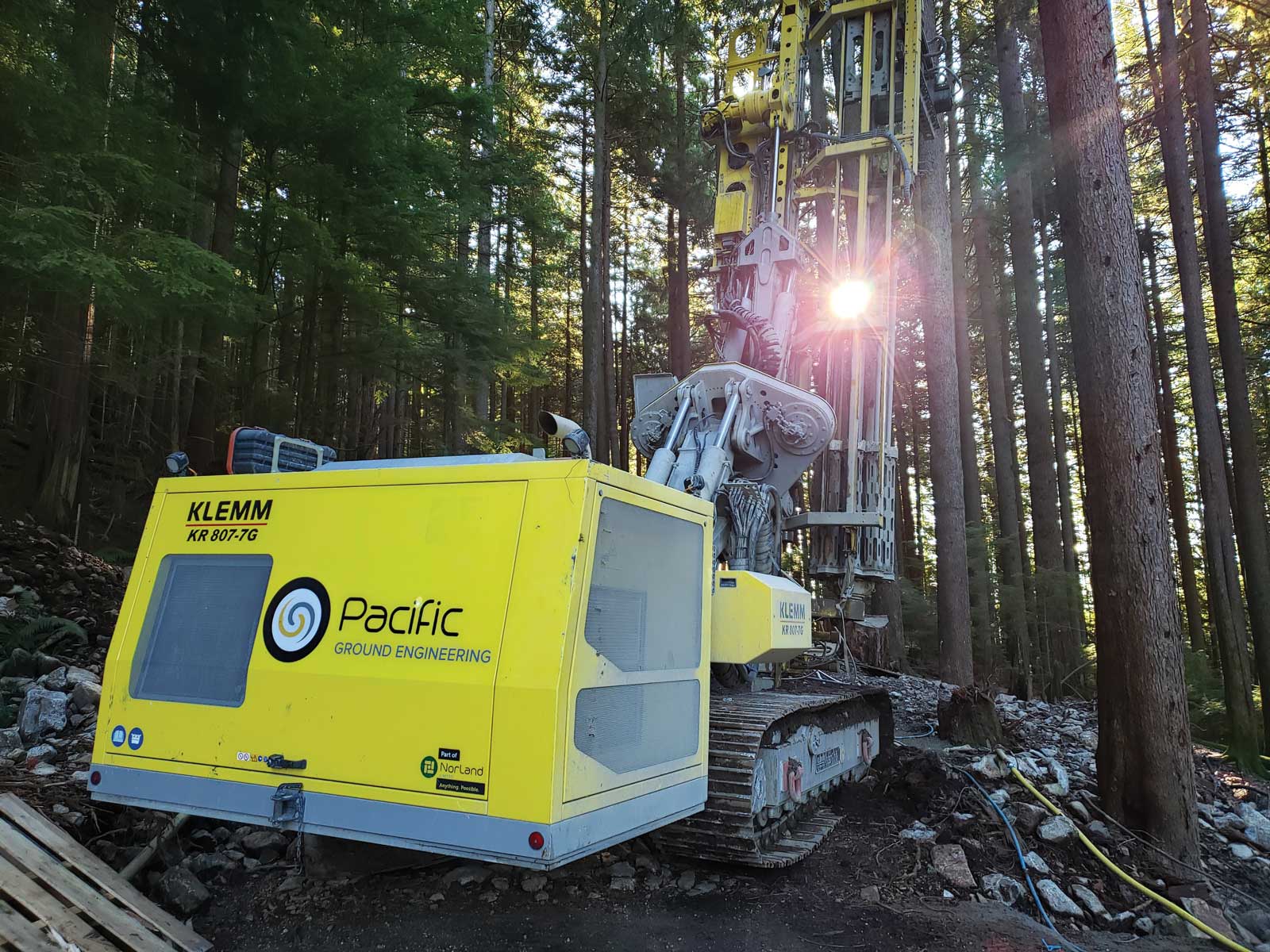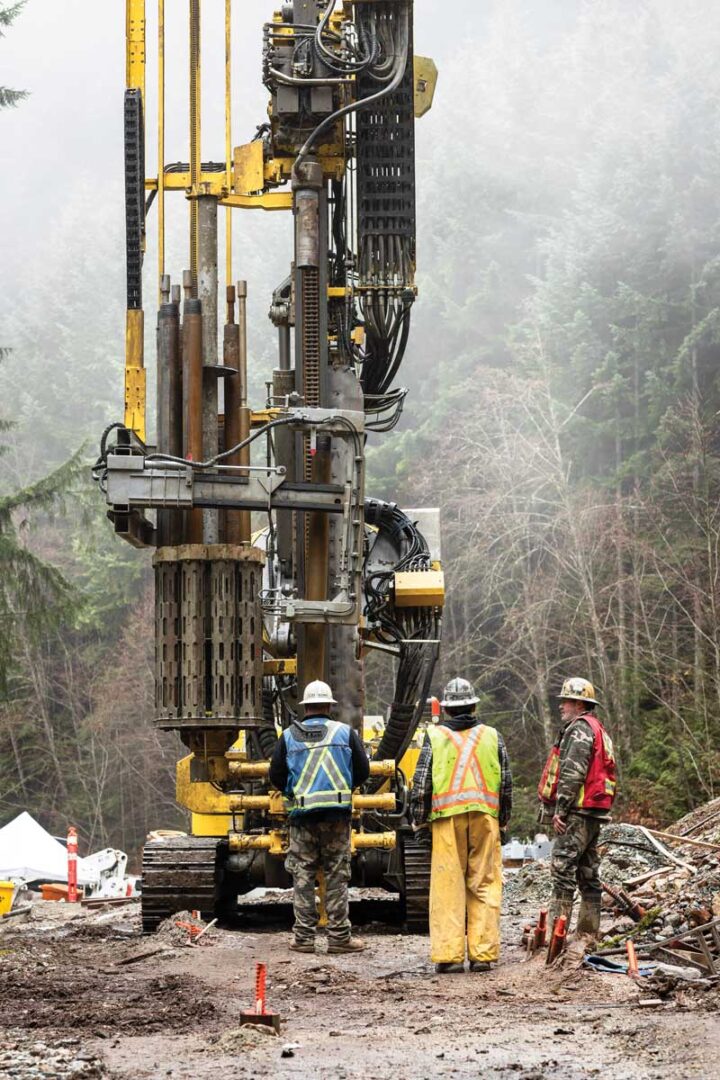
Pacific Ground Engineering (PGE) – a division of B.C.-based NorLand Limited that installs micropiles as one of its specialties – is known for taking on and coming up with solutions for difficult jobs.
A good example is the part PGE played in the construction of a debris flow barrier at Grouse Mountain, a popular ski and hiking destination located in the North Shore Mountains across the Burrard Inlet from downtown Vancouver. The Grouse Mountain ski resort and the Metro Vancouver Regional District decided the barrier was needed after debris from flooded creeks washed into the gondola parking lot at the base of the mountain a few years ago.
After NorLand was awarded the contract for the project, PGE was tasked with drilling the foundation piles for the debris flow barrier — a job which according to PGE’s general manager, Ermanno Rambelli, was no simple matter. “I think we’re known for our flexibility and our capability to resolve challenging technical requirements,” said Rambelli. “This was a very challenging job. The potential force hitting the barrier could be quite significant, and therefore the designed foundation piles were a crucial component of the system.”
The project, which was completed in March 2020, required a couple of flexible net barriers comprised of steel pylons and mesh to be erected. According to Rambelli, about 2,500 metres of micropiles and supporting tieback anchors had to be drilled and installed for the two structures (one 128 metres long and the other 104 metres) that were up to four metres high.
Rambelli says the ground the PGE crew had to drill into was anything but ideal. “We had to install these piles into a very difficult and challenging ground, which was basically heterogenous debris on a slope with a lot of irregular voids. When it came to grouting the piles, it was extremely difficult because of these voids in the ground, so we had to come up with solutions to resolve that,” he said. “We tried different techniques until we eventually managed to find a suitable technical solution, and when we tested the piles, they all passed the engineering specifications. We were quite proud of that work.”
Rambelli says PGE is able to come up with innovative geotechnical and ground improvement solutions because of the combined experience of the company’s workforce and its expertise in collaborating with local geotechnical engineers, as well as the broad range of equipment and advanced piling, soil anchoring and grouting capabilities that PGE can bring to the jobsite.
PGE has a variety of drilling rigs at its disposal, from mini drills for use in tight spaces such as an office room or the basement of a church or school, to large, hydraulic rigs that can install micropiles and ground anchors up to one foot in diameter. “Because we have this variety of equipment, it allows us to drill through any type of ground,” said Rambelli.
Shared resources
As one of 16 divisions under the NorLand umbrella, PGE operates independently, but also has the luxury of sharing resources and projects with its sister companies. “NorLand is quite diversified, and there is a lot of interaction and cross-pollination between divisions,” said Rambelli. He adds that PGE has eight people working at its headquarters in Burnaby, B.C., and it relies on a labour pool shared with other NorLand divisions for workers in the field.
Rambelli says the majority of PGE’s work in recent years has come from residential development in and around Vancouver, noting his company is frequently requested to install foundation piles for seismic upgrades to schools, hospitals and other public buildings, as well as new multi-unit housing projects. He says that PGE continues to expand into other sectors and is currently involved in a number of projects for mining, electric utility and industrial clients.


“We realize that by diversifying and not being tied to one particular sector, Pacific Ground Engineering always manages to access interesting project opportunities, no matter where the work is,” he said. “The baseline approach for installing micropiles is fundamentally similar for various applications, whether it’s for a residential development or for a power line. However, the trick is in the technical details. That’s where we can implement innovative solutions and enhance both efficiency and results.
“We don’t see the world as being too compartmentalized and we are open to working on anything and anywhere there is a need for our particular specialization. We have a team that is flexible enough to relocate and cover that work wherever we need to go.”
Rambelli says he’s particularly interested in taking on more work in the mining and energy sectors. “We are already doing some good, interesting work in this sector, but there is a lot more potential that we could pick up,” he said. “Before coming to PGE, I worked as a project management consultant on major mining projects, so mining is something that is quite familiar to me. I would be happy to see us growing and picking up more work in that sector for sure.” Rambelli says PGE has recently completed a project in Whitehorse for Yukon Energy and is looking into a potential project in Alberta. Expanding its geographic client base to other provinces in Western Canada is a priority for the company.
Promoting sustainability
Sustainability is a term heard a lot these days. According to Rambelli, it’s a commitment that PGE and its parent company NorLand take very seriously.
“We’re looking at ways to reduce emissions year after year. For example, by using more sustainable and efficient driving techniques, using more fuel-efficient vehicles, using fewer vehicles on projects and selecting more efficient equipment whenever that is possible,” said Rambelli. “We know sustainability isn’t only about the environment — it’s also around how we manage and treat our people. We are a very diversified company and variety makes us strong. We have people working here from all over the world and we focus our culture on equity, diversity and inclusivity. When it comes to sustainability in construction, we feel we’re really on the front line trying to push the envelope.”
Rambelli says that ensuring the health and safety of workers is another core principle at PGE. “We work really hard on that front,” he said, safety discussions are a key aspect of project operation and management meetings held twice a week at PGE. “We track every single near miss and every single incident that happens, so we can see where the major risks come from and we can work with our safety experts to mitigate them.”
The pandemic, of course, brought a whole new set of risks. Rambelli says PGE was quick to address these by introducing a raft of safety measures around PPE, sanitization and social distancing. “We came up with solutions on how to reorganize our work on the construction sites to comply with all the requirements from the Health Officer of B.C.,” said Rambelli. “It was quite a hectic period when we put all of that in place, but it worked. We’ve had no issues whatsoever since then when it comes to Covid in our division.”
Rambelli says because construction was designated an essential service in B.C., PGE and its employees have fortunately been able to continue working throughout the pandemic. “We did experience a little bit of slowdown, particularly towards the end of 2020, when some of our clients were deferring projects, just waiting to see what was going to happen with the economy,” he said.
Rambelli is upbeat about 2021, saying it’s shaping up to be an exciting year for business for PGE. “There are still projects that are getting deferred, but that is something that I typically see at the beginning of the year anyway,” he said. “But there are a lot of opportunities that are waiting to trigger. I’m pretty optimistic that things [are] looking good because there are many projects happening across Canada.”
Rambelli says growth is definitely one of his company objectives and expanding PGE’s fleet of drilling rigs is high on his priority list. “We are a relatively small division within Norland, but ideally in [the] future we want to double in size. That’s the plan,” he said. “To do that, we have to hire really good people who are passionate about the work we do, and we need to consistently make investments in equipment to be ready for the work that will come our way.”